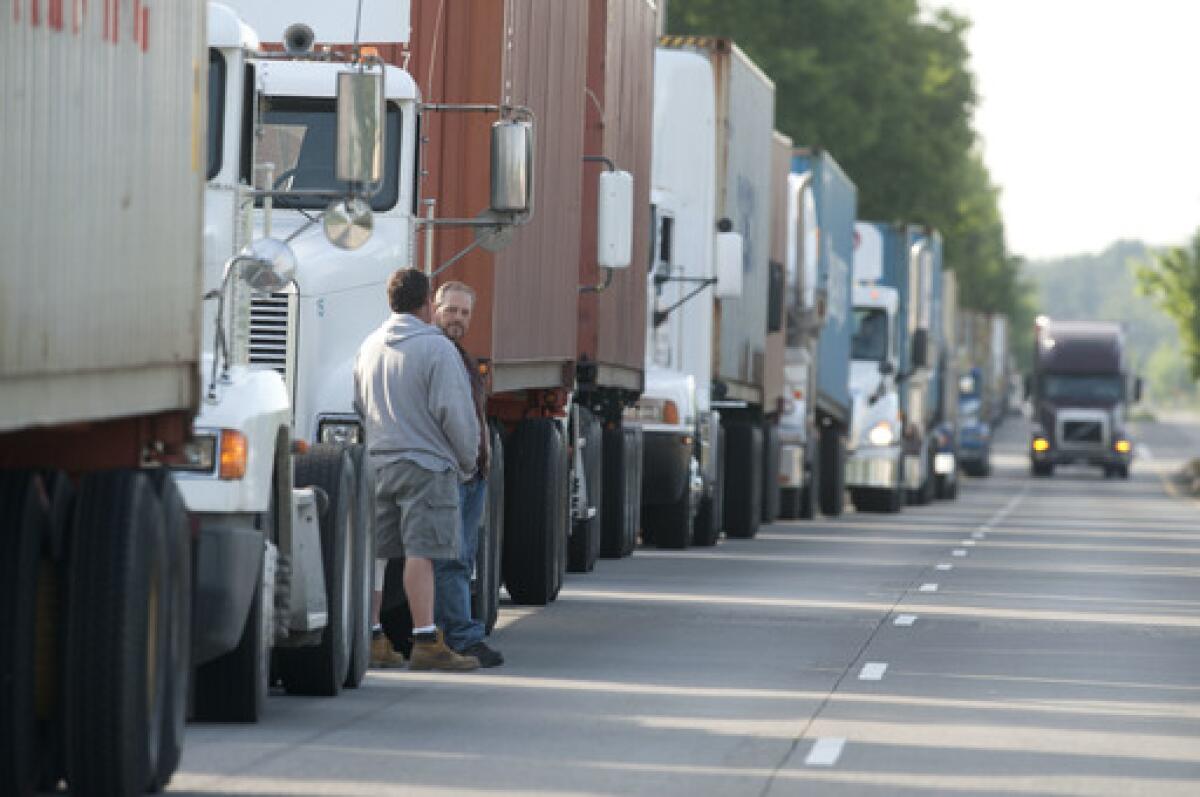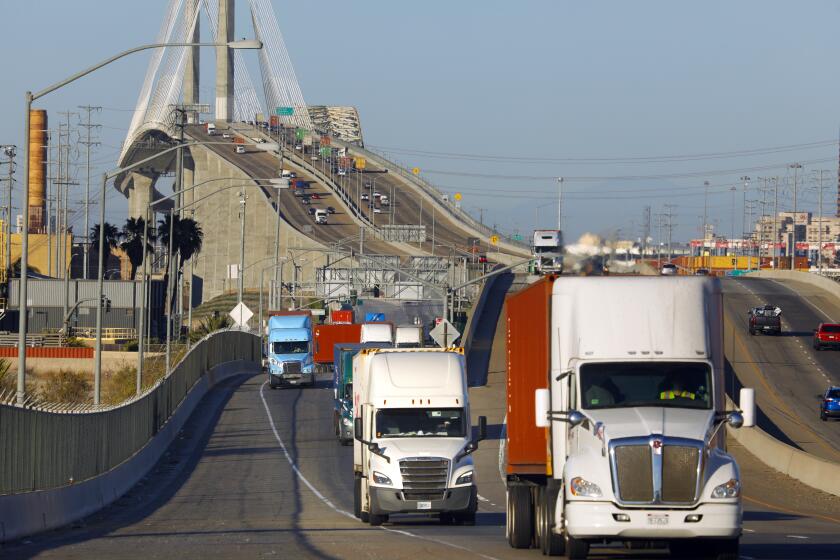When truckers voted to unionize, their employer retaliated with illegal layoffs, judge rules

- Share via
Weeks after a group of port truck drivers voted to unionize, they opened their mailboxes to find termination notices from their employer. That letter was a violation of federal labor law, a judge ruled Tuesday in a decision that will reinstate the terminated drivers with back pay and interest.
The drivers worked for Universal Intermodal, an affiliate of Universal Logistics Holdings, which operates several companies that transport freight containers and merchandise flowing through the ports of Los Angeles and Long Beach. They are some of the busiest ports in the Western Hemisphere, particularly in recent weeks with a massive supply chain bottleneck causing gridlock at the Port of L.A. The group of about 30 drivers voted to join a local of the International Brotherhood of Teamsters.
Administrative Law Judge Michael A. Rosas found in his ruling that the company was in violation of federal labor law on multiple counts. He said that the company unlawfully interrogated and fired two employees leading union efforts and that once workers at the facility unionized, it slashed their hours, closed the Compton facility where many of them worked, and laid off the unionized workers in order to punish them for organizing.
The company laid off about 70 employees in total from facilities in Compton and Fontana, including workers employed by its Roadrunner and Universal Trucking subsidiaries.
Rosas found in his ruling that the company laid off these other workers to crack down on future union activity by getting rid of “all employee drivers who were or could be tainted by the union,” and then moving forward with plans to hire new “untainted employee drivers days after the layoff,” the judge wrote.
XPO Logistics, one of the world’s largest trucking companies, settled with drivers who had alleged it paid them less than minimum wage.
“Judge Rosas today made clear that the Universal group of companies violated the law at the ports of Los Angeles and Long Beach in a blatant effort to trample on employees’ fundamental right to form a union,” Ron Herrera, the Teamsters port division director, said in a statement. “We cannot allow any corporation, no matter how big, to ignore the law, especially as drivers work tirelessly to address the backlog at the ports and supply our community with the goods they need this holiday season.”
Universal Logistics Holdings did not immediately respond to a request for comment.
Universal Logistics labor counsel John Ferrer disputed the allegation that the company closed the Compton facility in response to union activities, writing in a letter referenced in Rosas’ ruling that it made the decision to close the facility and lay off port drivers before the union’s certification for “legitimate business reasons.”
“Labor costs were not a factor in the decision to close the terminal,” Ferrer wrote.
Richard Tatge worked for Universal Logistics at its yard in Fontana for almost two years. The San Bernardino resident connected with the Teamsters in August 2019 and began organizing his co-workers.
At first, he had few complaints with the job, Tatge said in an interview in March. But the longer he worked the more he worried about the precariousness of his position. Grievances piled up. Tatge worked 10- to 14-hour days, the cost of medical insurance ate up a huge chunk of his paycheck and the company failed to cover basic truck maintenance. Tatge said turnover among supervisors was high, making it difficult for them to follow through and fix issues raised by drivers.
“It was very much like, ‘If you can’t handle the work, you need to leave,’” Tatge said. “We saw that happening, and we knew we didn’t have much security in that job.”
Workers voted to unionize on Dec. 4, 2019. Two days later, the company decided to close its Compton facility. Drivers’ workloads were reduced, and shortly after, they received notices of termination.
The laid-off drivers’ workloads were transferred to contracted truckers, also known as “owner-operators.” In late December 2019, the company solicited applications for employee port driver positions at a facility just four miles north of the Compton facility. The company did not offer those positions to laid-off workers, according to the ruling.
Company and union representatives discussed a potential settlement of the unfair labor practice charges, but those discussions crumbled. At one point, the company’s director of labor and contractual relations, Michael Vagts, sent a laid-off worker who was asking to be reimbursed for some gas expenses a $250 check along with a signed “confidential settlement agreement and general release.” The check paystub noted that the payment was for a National Labor Relations Board settlement. The worker did not sign the agreement or cash the check.
A Teamsters organizer wrote to Vagts demanding he cease and desist from engaging directly with workers on a settlement agreement. “Not only does this settlement agreement contain illegal provisions, but the attempt to require (a worker) to waive his vast array of rights for $250 is shameful,” the organizer wrote. Signing such an agreement would have waived the worker’s right to more than seven months of back pay, the judge noted.
Rosas’ ruling requires that Universal Logistics recognize the union within two weeks as the bargaining representative of all full-time and regular part-time port drivers working or dispatched out of the company facility in Compton. Universal Logistics is also required to “bargain in good faith with the union regarding wages, hours and working conditions, and if an agreement is reached with the union, sign a document containing that agreement.”
The NLRB first charged Universal Logistics back in March with about 20 violations of federal labor law. The case was tried remotely via Zoom video conference in June.
State lawmakers and labor advocates have sought to boost protections for truckers — who are often classified as independent contractors and therefore ineligible for basic labor protections, such as the ability to collectively bargain for wages — and crack down on misclassification of drivers. Last month, Gov. Gavin Newsom signed Senate Bill 338, written by state Sen. Lena Gonzalez (D-Long Beach), that aims to hold retailers accountable when they contract with trucking companies that have repeatedly engaged in driver misclassification.
Although workers at Universal Logistics sought to join the Teamsters for more comprehensive protections, another freight transportation company, XPO Logistics, filed a petition for an NLRB-administered vote to remove Teamsters representation from the workplace. Teamsters officials voluntarily backed out Wednesday rather than move forward with the vote, according to a news release from the National Right to Work Legal Defense Foundation, which provided free legal assistance to the petitioners.
More to Read
Inside the business of entertainment
The Wide Shot brings you news, analysis and insights on everything from streaming wars to production — and what it all means for the future.
You may occasionally receive promotional content from the Los Angeles Times.












